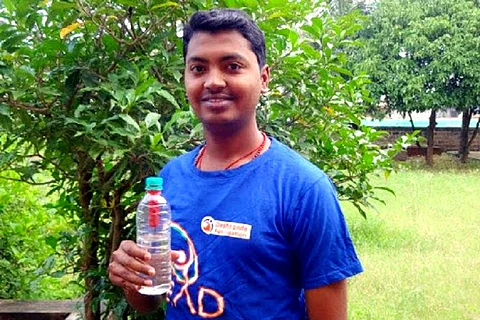

Niranjan Karagi, a fourth year mechanical engineering student, clearly remembers the sight which made him think about the amenities most of us take for granted. Around May last year, the Belagavi resident and his friends were at a school playground near his house. There were a few government school children playing there too.
Niranjan noticed that while most of them were carrying PET bottles (like Bisleri and soft drink bottles), they were filling water in those bottles from a nearby tank. He estimates that the tank hadn't been cleaned in about six months. "It was clearly water that wasn't meant for drinking, but these kids probably didn't have access to filters, most of which are very expensive," he narrates.
After returning home, Niranjan started researching, hoping there would be an inexpensive filter which could help those in need. He found none. And hence was born the idea of 'NirNal', a water filter which costs just Rs 20 and fits in any standard PET bottle.
Niranjan says that since NirNal was launched in August 2016, he has sold close to 8,000 filters, mostly to government schools, local farmers and people who cannot afford expensive water-purifying technology. While the majority of the sales have been in Karnataka, a few schools in Telangana and Maharashtra have also bought them.
Built with just four components - activated carbon, cotton, netted mesh and one other component which Niranjan chooses to withhold - NirNal reportedly purifies water by up to 70% making is potable. Measuring only a few centimeters in length, the filter is inserted into a bottle after filling water. It works by filtering impurities and sediments as you drink from the bottle. Niranjan also says that it can be used to purify up to 100 litres of water, depending on the water quality.
After Niranjan decided he wanted to help build a cost-effective and portable water filter, he approached Deshpande Foundation, an NGO which encourages entrepreneurial innovations for sustainable living. Under their Leader Acceleration Development (LEAD) programme, they gave Niranjan an initial budget of Rs 6,000 and put him in touch with Sandbox Startup, an incubator in Belagavi.
After a few weeks of trial and error, Niranjan sent water samples purified with NirNal to government certified labs in Belagavi for chemical and bacteriological analysis. The purified samples passed the test and NirNal was good to go.
However, getting people to trust a low-cost, small plastic cylinder as a water purifier was not easy. So, Niranjan began visiting the schools in his area which did not have potable water and gave them demonstrations. After instilling confidence in the authorities about the safety of the filter, Niranjan began getting bulk orders. That his innovation was picked up by the media and popularised on social media also helped.
Now, the water filters are built by semi-automated machines before they come to him. Niranjan has employed three uneducated women to build the filters further and pays them from his own pocket and the marginal profits the filters make, about Rs 4 per piece. "The reason we've kept this much margin is because we want to continue innovating and building more of these products which can help those in need," Niranjan explains.
He also applied for a patent two months ago and plans to approach the Karnataka government to make NirNal filters available and distribute them on a larger scale.
The feedback, Niranjan says, has been majorly positive with one drawback - some people have raised the issue that the filters wouldn't fit in a bottle with a broader mouth. The issue was raised last month and Niranjan says they are working to bring out a filter with adjustable breadth so that it's compatible with different bottles. He adds that they should be able to launch the modified filter in the coming few weeks.
He wishes to continue keeping the filters cost-effective despite their popularity. "There would be nothing differentiating NirNal from the expensive filters in the market if those in need cannot buy them. I believe there's no point of having knowledge if we do not use it to do some good," Niranjan says.
(This story was first covered by Payal Gangishetty for The New Indian Express.)